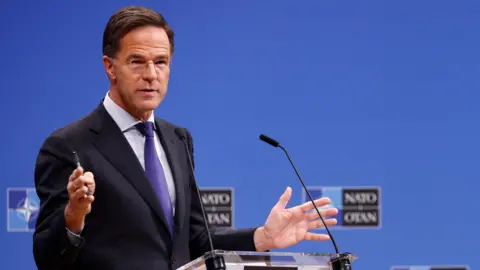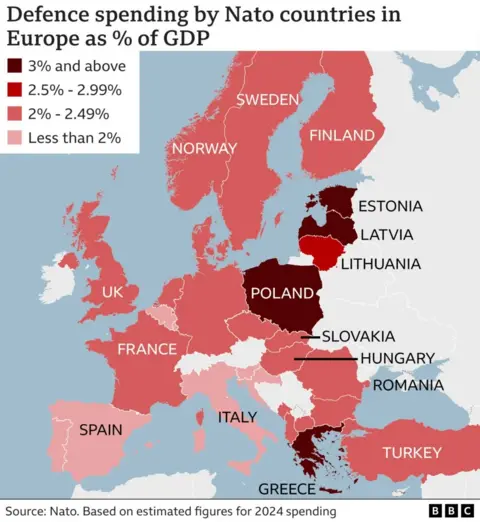Nato must switch to a wartime mindset, warns secretary general
The head of Nato has said it is time to "shift to a wartime mindset", as he warned the military alliance's members were not spending enough to prepare for the threat of a future conflict with Russia.
Secretary general Mark Rutte said Moscow was "preparing for long-term confrontation with Ukraine and with us", describing the current security situation as the worst in his lifetime.
"We are not ready for what is coming our way in four to five years," he said in his first major speech since becoming secretary general in October, urging members to "turbocharge" their defence spending.
His comments come weeks before president-elect Donald Trump takes office, having previously suggested the US would not protect Nato allies that were failing to spend enough on defence.
 Reuters
ReutersNato members have pledged to spend at least 2% of the value of their economies - measured by GDP - on defence per year by 2024.
But speaking at an event in Brussels, the former Dutch prime minister said "a lot more" would be needed as danger "[moves] towards us at full speed".
He said European members had spent upwards of 3% of GDP on defence during the Cold War.
"If we don't spend more together now to prevent war, we will pay a much, much, much higher price later to fight it," he said.
He added that Russia's economy was "on a war footing", with its defence spend by 2025 set to be "a third of Russia's state budget – and the highest level since the Cold War".
Russia has significantly increased its defence spending since launching its full-scale invasion of Ukraine, with record levels approved for 2025.
Rutte spoke at a critical juncture in the war in Ukraine, with Russian forces grinding forward in the east of the country. By November, Moscow had seized six times as much Ukrainian territory in 2024 compared with the whole of 2023.
While the average defence spend for Nato members in Europe and Canada is estimated at 2%, not all meet the target.
Trump said in February that he would "encourage" Russia to attack any Nato member that fails to pay its bills as part of the Western military alliance.
Nato's 32 members in Europe and North America agree that if one member is attacked, the others should help defend them.

Speaking to the BBC following his speech on Thursday, Rutte said: "Donald Trump was completely right when in his first term he forced us to spend more, he was successful, we are considerably spending more than before he became president, so in that sense he was totally right."
This is why some in Nato call Rutte "The Trump Whisperer". And that, they say, is a very big reason he was chosen as Nato secretary general.
Back in 2018, then President Trump famously threatened the US would "go our own way" if other Nato members - essentially in Europe - did not spend more on their own militaries. Then Dutch Prime Minister Rutte was credited with reasoning with the US president, assuring him that spending had already gone up and that he, President Trump, was the reason for it.
And now Trump is poised to return to the White House and Rutte wants to keep the US committed to Nato and European defence. So Rutte's messaging to Trump is once again to flatter him.
As a former prime minister, Rutte well knows that Europe's leaders hesitate to spend much more on defence because voters across the continent have other priorities - rising living costs, health, migration.
That, he told the BBC, is why he aimed his speech today as his "plea" to "people".
"I'm really pleading directly to the one billion people living in Nato territory, and particularly in Canada and Europe, to ask them to help me," Rutte said.
"Call up your politicians, tell them that you agree that yes it is difficult, it will mean somewhat less spending on some other items, but that you want them, your politicians, to prioritise defence, because this is long-term crucial…
"My plea here is if you have children, grandchildren, if you think our way of life should be preserved, the democracy, our values, then we have to prioritise defence.
"And if we don't, in four or five years we are in real difficulty."
